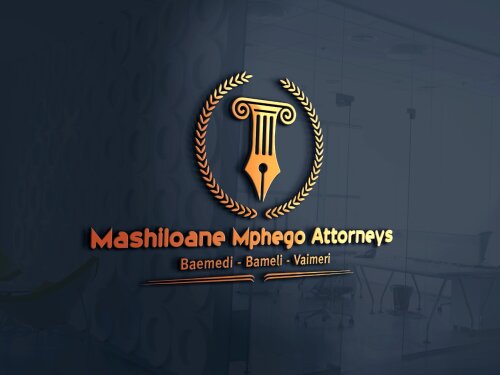Best Collaborative Law Lawyers in Burgersfort
Share your needs with us, get contacted by law firms.
Free. Takes 2 min.
Free Guide to Hiring a Family Lawyer
List of the best lawyers in Burgersfort, South Africa
About Collaborative Law in Burgersfort, South Africa
Collaborative Law is an alternative dispute resolution process designed to help couples or parties resolve disputes outside of the traditional court system. In Burgersfort, South Africa, Collaborative Law is often used in family law matters, such as divorce, property division, child custody, and maintenance. The process involves both parties, their attorneys, and potentially other professionals (such as financial advisors or child specialists) working together to negotiate a settlement that is mutually acceptable. The goal is to avoid litigation, minimize conflict, and reach agreements respectfully and efficiently.
Why You May Need a Lawyer
You may require a Collaborative Law lawyer in various situations, especially when facing legal disputes that could benefit from a cooperative and less adversarial approach. Common scenarios include:
- Divorce or separation, where both parties want to preserve dignity and reduce conflict
- Determining child custody and visitation arrangements
- Negotiating spousal or child maintenance
- Resolving property or financial disputes after relationship breakdowns
- Family disputes involving inheritance or wills
- Business partnership disagreements within families
- Any other civil matter where the relationship between parties is important to maintain
Lawyers trained in Collaborative Law can guide you through the process, protect your rights, and help promote solutions that suit everyone involved.
Local Laws Overview
In South Africa, Collaborative Law is not governed by specific legislation but operates within the framework of existing civil and family law statutes, as well as the South African Constitution's emphasis on human dignity, equality, and rights. In Burgersfort, as part of Limpopo Province, the following aspects are particularly relevant:
- The Children’s Act 38 of 2005 provides guidelines on what is in the best interests of children in custody and maintenance matters.
- The Divorce Act 70 of 1979 governs aspects of divorce, spousal maintenance, and property division.
- Agreements reached through Collaborative Law must comply with legal standards to be enforceable in court.
- Confidentiality is a key principle in Collaborative Law sessions; communications are generally not admissible in court should collaborative efforts fail.
- Both parties must agree to the process, and participation is voluntary.
- Collaborative Law aligns with the South African judiciary’s encouragement of alternative dispute resolution to alleviate court congestion and promote reconciliation where possible.
Frequently Asked Questions
What is the main purpose of Collaborative Law?
Collaborative Law aims to resolve disputes amicably and without litigation by encouraging open communication, cooperation, and problem-solving between parties with the help of their lawyers.
How does Collaborative Law differ from mediation?
In Collaborative Law, each party has their own lawyer, and all parties work together in face-to-face meetings. In mediation, a neutral third party (the mediator) facilitates discussions, and parties may not have direct legal representation during sessions.
Is Collaborative Law legally recognized in South Africa?
While there is no specific law governing Collaborative Law, South African courts recognize and enforce settlement agreements reached through collaborative processes if they are in line with the law and public policy.
Who can participate in Collaborative Law?
Any parties involved in a dispute, such as spouses, parents, or business partners, can choose Collaborative Law if they are willing to work cooperatively and commit to resolving their issues outside of court.
What types of disputes are suitable for Collaborative Law?
Collaborative Law is particularly effective for family law matters like divorce, child custody, and maintenance, but can also be used for other civil matters where ongoing relationships matter.
What happens if we don’t reach an agreement?
If a settlement cannot be reached, the collaborative process ends, and both parties are free to proceed with traditional litigation, but they typically must find new legal representation before doing so.
Are collaborative sessions confidential?
Yes, the process is confidential, and anything discussed during sessions usually cannot be used as evidence in subsequent court proceedings.
How long does Collaborative Law take compared to going to court?
Collaborative Law generally resolves disputes more quickly than litigation, as it avoids court delays and focuses on direct negotiation and resolution.
How do I find a Collaborative Law lawyer in Burgersfort?
You can search for local firms or attorneys with family law and collaborative law training, check with the Law Society of South Africa, or ask for referrals from trusted community resources.
What are the costs involved?
Costs can vary depending on the complexity of your case and the professionals involved, but Collaborative Law is often more affordable than traditional litigation because it tends to require less time and fewer court appearances.
Additional Resources
If you need further guidance or support regarding Collaborative Law in Burgersfort, consider the following resources:
- Limpopo Provincial Office of the Family Advocate: Offers services related to child custody, maintenance, and family dispute mediation.
- Law Society of South Africa: Provides information on accredited attorneys and alternative dispute resolution professionals.
- Department of Justice and Constitutional Development: Has resources on family justice, children's matters, and dispute resolution.
- South African Association of Collaborative Professionals: (Where available) Offers directories and information on collaborative practitioners.
- Local Community Legal Clinics: Provide initial guidance or referrals for individuals seeking collaborative solutions.
Next Steps
If you believe Collaborative Law may be suitable for your situation in Burgersfort, consider the following steps:
- Reflect on your goals and willingness to engage cooperatively with the other party.
- Seek recommendations for collaborative lawyers from reputable local professionals or community sources.
- Arrange initial consultations with one or more attorneys to discuss your needs, the process, and potential costs.
- Confirm the lawyer’s experience and training in Collaborative Law.
- If both parties agree, sign the appropriate participation agreements and begin the collaborative process with professional guidance.
- Use available resources for support and information throughout the negotiation process.
Collaborative Law can offer a respectful, efficient, and empowering alternative to lengthy legal battles. Seeking professional legal advice early can ensure you approach the process with clarity and confidence.
Lawzana helps you find the best lawyers and law firms in Burgersfort through a curated and pre-screened list of qualified legal professionals. Our platform offers rankings and detailed profiles of attorneys and law firms, allowing you to compare based on practice areas, including Collaborative Law, experience, and client feedback.
Each profile includes a description of the firm's areas of practice, client reviews, team members and partners, year of establishment, spoken languages, office locations, contact information, social media presence, and any published articles or resources. Most firms on our platform speak English and are experienced in both local and international legal matters.
Get a quote from top-rated law firms in Burgersfort, South Africa — quickly, securely, and without unnecessary hassle.
Disclaimer:
The information provided on this page is for general informational purposes only and does not constitute legal advice. While we strive to ensure the accuracy and relevance of the content, legal information may change over time, and interpretations of the law can vary. You should always consult with a qualified legal professional for advice specific to your situation.
We disclaim all liability for actions taken or not taken based on the content of this page. If you believe any information is incorrect or outdated, please contact us, and we will review and update it where appropriate.










